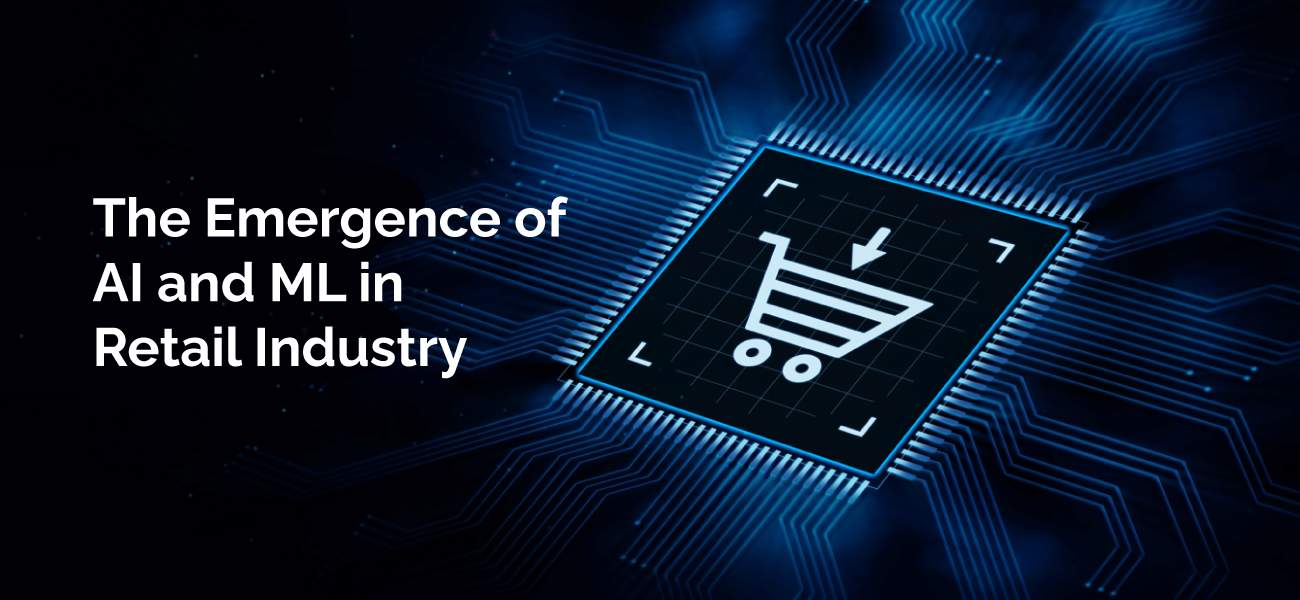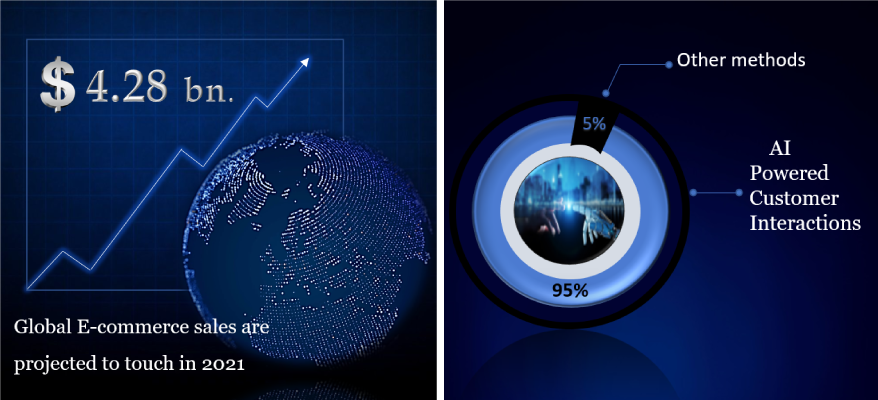
Posted on: April 9th, 2021
The Emergence of AI and ML in Retail Industry
AI’s presence in the present and future of the E-commerce retail
Did you know that global E-commerce sales are projected to touch $4.8 billion in 2021? Servion predicts that, by 2025, AI will power 95% of all customer interactions, including live telephone and online conversations that will leave customers unable to ‘spot the bot’. Wouldn’t you want to be one of those companies that keep AI at arm’s length to stay relevant?
Artificial Intelligence has advanced to a place where it has become a relevant component of the e-commerce industry, especially retail. Many businesses are exploiting this advancing trend by using different forms of AI to understand their customers like behavioral analytics, visual reality, chatbot, etc. E-commerce marketplaces are leveraging Artificial Intelligence to aid customers with superior experiences and for simplifying the various operations.
4 ways how AI is revolutionizing the retail industry.

1. Personalized recommendations for shoppers
Among the major applications of artificial intelligence in e-commerce, personalized product recommendations for online shoppers are increasing conversion rates and average order values. With the use of big data, AI in e-commerce is impacting customer choices thanks to its knowledge of previous purchases, searched products, and online browsing habits. Using their previous data such as products previously bought by the customer, previously rated, when the customer buys a product, when does the customer rate a product, and when does the customer like a product; based on these analytical data it derives product recommendations and increases the customer engagement.
2. Creating Customer-Centric Visual Search
When you look at e-commerce giants like Amazon, they are quick to adopt this technology thus leading to the rise of those companies that make extraordinary sense of visual data. Here is when AI comes into action. To tackle this issue AI tends to use NLP or natural language processes to contextualize and improve the search result. Not only this, but AI uses image recognition technology that tends to match the product.
3. Inventory Management
While the conventional form of inventory management was restricted to current stock levels, AI-enabled inventory management is enabling how to maintain stocks based on data related to sales trends over the previous years, the projected or anticipated changes in product demands, and potential supply related issues that could impact inventory levels. Along with inventory management, AI is enabling warehouse management with the emergence of automated robots that are being projected as the future of artificial intelligence in E-commerce. Unlike human employees, AI robots can be used to store or retrieve stocks 24×7 along with immediate dispatching of ordered items following online orders.
4. Chatbots and virtual assistants
The only reason why the e-commerce industry can offer 24*7 assistance is because of chatbots. These bots tend to offer the customers all the possible solutions and great customer engagement. Natural Language Processing, a subfield of AI, is formative to chatbots. While text classifiers, artificial neural networks and Natural Language Understanding (NLU) are used to understand the input given by a user, Natural Language Generation (NLG) is used to generate a response that is both helpful and natural sounding. A trend that will only increase, AI chatbots will continue to assist e-commerce marketplaces in a big way.
The Future of AI in retail
AI’s presence in e-commerce is already huge but more applications of AI are about to infiltrate the marketplace making customers reach buying decisions easier. Wouldn’t it be easier to make last-mile delivery easy, especially in light of the pandemic one would rather have a bot replace humans or weeding out fake reviews as 88% of the customers tend to trust the online reviews?
We will be seeing Artificial Intelligence assisting e-commerce in the areas of customer experience, customer relationship management, personalization for the customers, warehouse management, advertising capabilities for sellers, website and app optimization, fraud detection, business intelligence, the hiring of employees, etc.
As an online retailer, are you considering how to implement artificial intelligence for your business?
Please email us in case you are interested to hear more about us and how we can help your business?



